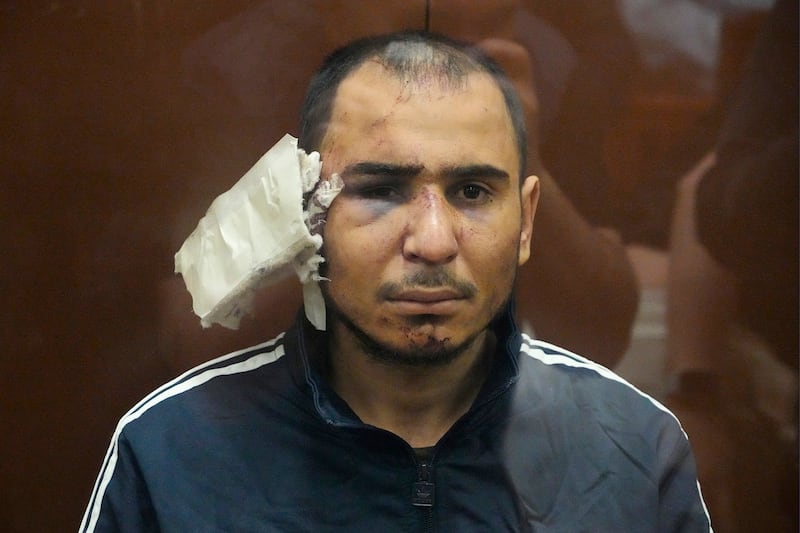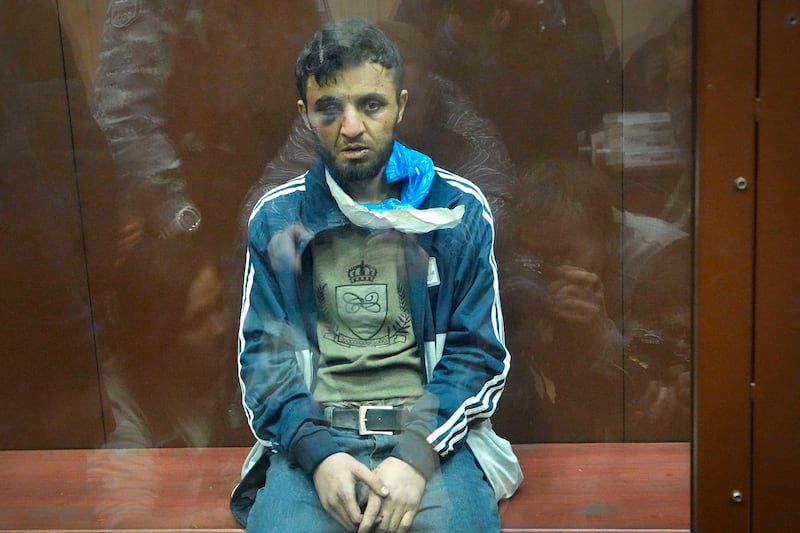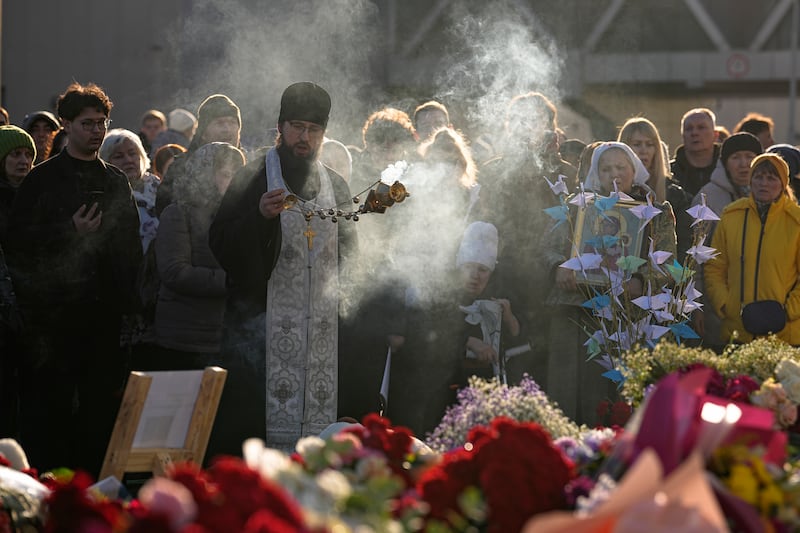Russian President Vladimir Putin said the gunmen who carried out the concert hall attack that killed nearly 140 people in Moscow last week were “radical Islamists”.
Speaking in a meeting with government officials, Mr Putin said the killings were carried out by extremists “whose ideology the Islamic world has been fighting for centuries”.
Mr Putin, who said over the weekend that the four attackers were arrested while trying to escape to Ukraine, did not mention the affiliate of the Islamic State group that claimed responsibility for the attack.
He again refrained from mentioning IS in his remarks on Monday.

He also stopped short of saying who ordered the attack, but said it was necessary to find out “why the terrorists after committing their crime tried to flee to Ukraine and who was waiting for them there”.
After the IS affiliate claimed responsibility, US intelligence backed up their claims. French President Emmanuel Macron said France has intelligence pointing to “an IS entity” as responsible for the Moscow attack.
Earlier on Monday, Kremlin spokesman Dmitry Peskov refused to assign blame, urging reporters to wait for the results of the investigation in Russia.
He also refused to comment on reports that the US warned authorities in Moscow on March 7 about a possible terrorist attack, saying any such intelligence is confidential.
As Mr Putin spoke, calls mounted in Russia to harshly punish those behind the attack.
Four men were charged by a Moscow court on Sunday night with carrying out a terrorist attack. At their court appearance, they showed signs of being severely beaten.
Civil liberties groups cited this as sign that Russia’s poor record on human rights under Mr Putin was bound to worsen.

Russia’s Prime Minister Mikhail Mishustin said the investigation is still ongoing but vowed that “the perpetrators will be punished, they do not deserve mercy”.
Former president Dmitry Medvedev, now deputy head of Russia’s Security Council, urged authorities to “kill them all”.
The attack on Friday night on Crocus City Hall on the western outskirts of Moscow left 139 people dead and more than 180 injured, proving to be the deadliest in Russia in years. A total of 97 people remained in hospital, officials said.
As they mowed down concertgoers with gunfire, the attackers set fire to the vast concert hall, and the resulting blaze caused the roof to collapse.
The search operation will continue until at least Tuesday afternoon, officials said. A Russian Orthodox priest conducted a service at the site Monday, blessing a makeshift memorial with incense.
The four suspects were identified in the Russian media as Tajik nationals. At least two of the suspects admitted culpability, court officials said, although their conditions raised questions about whether their statements were coerced.
The men were identified as Dalerdzhon Mirzoyev, 32; Saidakrami Rachabalizoda, 30; Shamsidin Fariduni, 25; and Mukhammadsobir Faizov, 19. The charges carry a maximum sentence of life imprisonment.
Russia’s Federal Security Service said seven other suspects have been detained. Three of them appeared in court on Monday, with no signs of injuries, and they were placed in pre-trial detention on terrorism charges. The fate of others remained unclear.
Russian media had reported the four were tortured during interrogation. Mirzoyev, Rachabalizoda and Fariduni showed signs of heavy bruising, including swollen faces. Mirzoyev had a plastic bag still hanging over his neck; Rachabalizoda had a heavily bandaged ear.

Faizov, wearing a hospital gown, appeared in court in a wheelchair, accompanied by medical personnel, and sat with his eyes closed throughout. He appeared to have multiple cuts.
Mr Peskov refused to comment on the suspects’ treatment.
Mr Medvedev, Russia’s president in 2008-12, had especially harsh comments about them.
“They have been caught. Kudos to all who were chasing them. Should they be killed? They should. And it will happen,” he wrote on his Telegram page.
“But it is more important to kill everyone involved. Everyone. Those who paid, those who sympathised, those who helped. Kill them all.”
Russian human rights advocates condemned the violence against the men.
Team Against Torture, a prominent group that advocates against police brutality, said in a statement that the culprits must face stern punishment, but “savagery should not be the answer to savagery”.
It said the value of any testimony obtained by torture was “critically low”, and “if the government allows for torture of terrorism suspects, it may allow unlawful violence toward other citizens, too”.
The attack was a major embarrassment for Mr Putin and came less than a week after he cemented his grip on Russia for another six years in a vote that followed the harshest crackdown on dissent since Soviet times.
Many on Russian social media questioned how authorities and their vast security apparatus that actively surveils, pressures and prosecutes critics failed to prevent the attack despite the US warning.
IS, which fought Russian forces that intervened in the Syrian civil war, has long targeted the country. In a statement posted by the group’s Aamaq news agency, the IS Afghanistan affiliate said it carried out an attack in Krasnogorsk, the suburb of Moscow where the concert hall is located.
In October 2015, a bomb planted by IS downed a Russian passenger plane over Sinai, killing all 224 people aboard, most of them Russian holidaymakers returning from Egypt.
The group, which operates mainly in Syria and Iraq but also in Afghanistan and Africa, has claimed responsibility for several attacks in Russia’s volatile Caucasus and other regions in past years.
It recruited fighters from Russia and other parts of the former Soviet Union.









